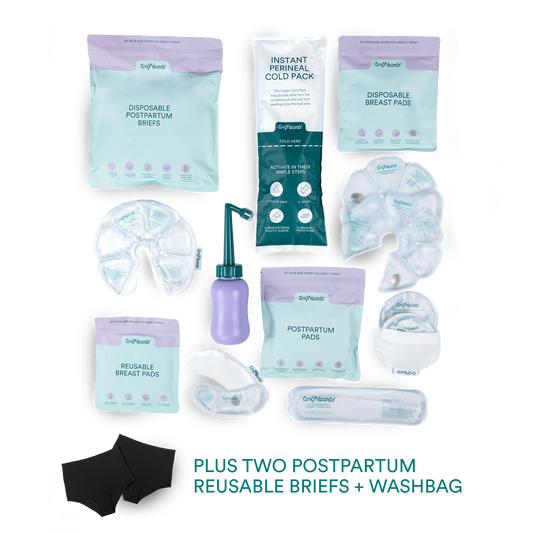At the end of the day there are many things paeds nurses know that will never be useful in day to day life... Understanding fevers however is a different story! I have lost track of the number of times a mama friend has text me when their bub's temps gone through the roof and they're questioning themselves. And what I realised is that just about every time that mama does know what to do but she just needs reassurance. It got me thinking that parents might feel more confident and empowered if they had a little more knowledge about fevers and what to do about them when they strike. So here goes...
Perhaps the first thing to know is that fevers are common in kiddies - and they're also a perfectly normal response of their little bod to an infection. I know a fever can be concerning but when it comes to a child's immunity we can praise fevers for letting us know bub's immune system is doing its job - And that's a good thing! The key factor I want you to remember is that when it comes to fevers, it's not about the number on the thermometer but about how your little love is within themselves.
So, what classifies a fever then?
A fever is a high temperature, specifically a temperature of 38 degrees celsius or higher.
What's happening in bub's body when they spike a temp?
You see, our bodies are pretty clever. All of us have a little body part that's like an internal thermostat, which resides in a part of the brain called the hypothalamus. This little guy knows what temperature your body is meant to be so it's constantly sending chemical messages to the other systems to keep it that way. The body's temp will fluctuate during the day and may go up with exercise or after a hot shower, overdressing or time in the sun - but in general the hypothalamus keeps our body temp on a pretty even keel. If the hypothalamus senses an infection however, it will "reset" the body's internal thermostat to a higher temperature, essentially activating "fight mode." Researchers believe that the reason for this is to make the body a more uncomfortable place for germs, and hence harder for these nasty bugs to survive.
What might cause this increase in temperature?
As we discussed above one of the most common reasons for a high temperature is the body's natural response to an infection. This could be a viral infection such as the common cold or an upper respiratory bug, or it may be bacterial such as pneumonia or a urinary tract infection.
Other reasons for fevers include chronic illnesses such as rheumatoid arthritis and ulcerative colitis, tropical diseases such as malaria or typhoid fever, heat stroke, some drugs and in rare cases malignant tumours. Immunisations can sometimes cause a low-grade temperature, particularly the Meningococcal vaccine. You may have also heard that bubs get temps when teething however this is not strictly true as the rise in temperature should only be minimal.
What are signs my bubs may have a fever?
- bub may seem hot to touch
- but just as common they may be shivering and feel cold
- appear unwell
- miserable, irritable or just not themselves
- sleepier than usual
- not tolerating food or fluids or vomiting
- bub appears to be in pain
So what do I do about it then?
If you take away one thing from this blog today it's that you treat symptoms not the number!
[The exception to this is very little bubs under 3 months. Because their immune systems are not yet developed and they can deteriorate quickly, a temp over 38 degrees in a bubba under 3 months, even without other symptoms, must receive medical attention ASAP]
If bub is older than 3 months though I want you to look closely to see what else is going on. If they are happy and well but that number's coming up high then it's a "watch and wait" scenario and there's no need for you to treat the fever just yet... If bub starts developing symptoms of concern it's then you'll spring into action!
As I say, if bub is otherwise fine they likely don't need medical assistance at this time. Despite this, the number on the thermometer still tells us an infection is likely being fought off in the background - so it's best to keep your little one away from newborns or immunocompromised people until you know for sure that they're well.
When do I treat it then?
If your little love is miserable or upset with a fever, or has pain such as a sore throat, you can give paracetamol or ibuprofen to help them feel more comfortable. Follow the dosage instructions on the packaging and use our medication tracker to prevent overdose. It's okay for bub to have both these medications on board at the same time but remember paracetamol is given no more than every 4 hours, yet ibuprofen you need to wait 6.
What else can I do to help them?
- It's normal for all of us when we're sick that we may not want to eat much, so if bub has a poor appetite this is okay. What's important however is staying hydrated. Give smaller but more frequent feeds or drinks.
- Keep breastfeeding or formula feeding. Offer extra feeds for bubs under 6 months. Bubs over 6 months can be offered water or oral rehydration solution too.
- Wipe bub's forehead with a face washer soaked in slightly warm water. Cold baths and showers are not recommended.
- Dress bub in enough clothing so that they're not too hot or cold. If bub is shivering add another layer.
- Rest is best! Encourage gentle quiet activities like reading stories or drawing pictures.
- Don't forget the power of cuddles! It's normal for bub to want to be more close to you when they're sick, so take a break yourself and soak up the snuggles!
When do I take bub to the doc?
When bub has a fever these are the kind of symptoms I want you to look out for that may indicate a trip to the doctor.
- Decreased wet nappies or weeing much less often - what we find in bub's nappy, or how often a child pees, actually tells us ALOT about their hydration status. When bub is fighting an infection we need to make sure they do not become dehydrated. Take notice of how many wet nappies your little one is having in a day and if this is decreased from their usual it may be time to head to the doc.
- Refusing feeds or fluids. Once again - hydration is so important. If your little love is refusing fluids they will be at risk of dehydration.
- Rashes are common with a virus and may not be an issue. A concerning rash is one that nurses call 'non-blanching' which means the rash doesn't disappear when pressed on. Check out the TH reel we did with the water glass.
- Drowsiness and decreased responsiveness
- Breathing concerns, increased work of breathing, coughing or wheezing.
- Vomiting or diarrhoea
- Pain that's not getting better with paracetamol and ibuprofen.
- If you're needing to use paracetamol or ibuprofen for longer then 48 hours.
- If bub is not getting better or you are concerned.
What are the red flags with a fever? What signs require urgent medical help?
- A temp of 38 or higher in a bub under 3 months - even if they have no other symptoms.
- A non-blanching rash as discussed above. This may indicate a serious illness such as meningitis/meningococcal.
- Breathing difficulties, change in colour, blue lips.
- A stiff neck or eyes that are sensitive to light
- Leaning forward and drooling.
- If bub's soft spot on the top of their head (fontanelle) is sunken in or bulging out.
- Seizures or fits.
But what about febrile convulsions?
You may have heard about febrile convulsions, a type of seizure, which can occur when a child's temperature rises very rapidly. Most children who get fever will only have mild discomfort, however, about 1 in 30 children experience a febrile convulsion. They are most common between the ages of 6 months and 6 years. It's reassuring to remember that it's not the fever itself that causes them, but rather the speed at which it's occurred. For this reason, febrile convulsions often happen before a parent has even realised their child has a fever. Febrile convulsions can be scary to witness but please know they are not harmful to your bub and do not cause long term brain damage. We cover febrile convulsions in our baby first aid courses to empower parents in the event of a seizure.
Key Takeaways
- All kiddies get fevers from time to time as their body's normal response to infection.
- Fever is not an illness in itself, but is a sign of one.
- Most fevers in children don't need medical attention. Rest, cuddles and care at home will often do the trick.
- Remember to treat the symptoms not the number!
- Look out for the red flags.
- If you're in doubt about how your bub is or you're becoming more concerned, trust your gut and head to the doc!
- Trust yourself mamas and papas, You've got this!








